- Home
- Aaron J. French
Aberrations of Reality
Aberrations of Reality Read online
Aberrations
of
Reality
Also by Aaron J. French
Up From Soil Fresh
Dreaming in Darkness
The Chapman Books
Works Edited:
Monk Punk
The Shadow of the Unknown
Songs of the Satyrs
Omnibus 2.0 (reprint volume of Monk Punk and The Shadow of the Unknown with additional material)
Aberrations
of
Reality
Aaron J. French
Crowded Quarantine Publications
Copyright © 2014 Aaron J. French
This Edition Published 2014 by Crowded
Quarantine Publications
The moral right of the author has been asserted
All characters in this publication are fictitious
and any resemblance to real persons, living or dead,
is purely coincidental.
All rights reserved.
No part of this publication may be reproduced,
stored in a retrieval system, or transmitted, in any
form or by any means without the prior
permission in writing of the publisher, nor be
otherwise circulated in any form of binding or
cover other than that in which it is published
and without a similar condition including this
condition being imposed on the subsequent purchase.
A CIP catalogue record for this book
is available from the British Library
ISBN 978-0-9928838-7-4
Printed and bound in Great Britain
Crowded Quarantine Publications
34 Cheviot Road
Wolverhampton
West Midlands
WV2 2HD
Acknowledgements
I wish to thank everybody I worked with over the duration of writing the stories for this book, particularly Eric J. Guignard, Jeani Rector, Adrian Chamberlin, and Michael Bailey, who all helped with individual edits on several of these stories; to John Palisano, my HWA mentor for much of the time; to Adam Millard with Crowded Quarantine Publications; and especially to Martha Swanson who helped edit this entire book and made it much better. And a HUGE thank you to Mark Valentine for writing the brilliant introduction, as well as to Tanith Lee and Storm Constantine for their wonderful assistance.
“Mystery is the abyss
which ceaselessly attracts
our unquiet curiosity
by the terror of its depth.”
—Eliphas Levi, The Key of the Mysteries (Aleister Crowley translation)
“A sense of the uncanny can be activated
in the average mortal under various conditions.
Principal among these conditions
are those which cause us to feel
that we are not what we think we are…”
—Thomas Ligotti, The Conspiracy against the Human Race
“Wisdom had been born, not a deity:
a deity which slew with one hand
while healing with another…
that deity was not the Savior,
and I said to myself,
Thank God.”
—Philip K. Dick, VALIS
“Man shall conquer death,
not by submitting to it as you teach,
and not by avoiding it in a mere prolongation of life,
as certain wise yet erring masters have taught,
though this may be a necessary step towards conquest,
but by entering into and annulling it.”
—Charles Williams, Shadows of Ecstasy
“The sad fact was that every sad fact in the world
was the raw material for a story.
Fiction thrived on desperation, on dejection, on violence.”
—Walter Jon Williams, This is not a Game
I’d like to dedicate this book to my former self, now gone and lost forever. Also to Veronica, for her endless love and support. Finally to Ron, for his wealth of spiritual insight and clarity.
Contents
Introduction | Mark Valentine
Here & There… | Page 13
Doubting Thomas | Page 15
Dwellers in the Cracks | Page 31
Rebirth in Dreams | Page 45
Horror Fiction as Mystical Didactic Experience | Page 55
A Storm of Lightning | Page 69
Whirling Machine Man | Page 79
The Graffiti Ghosts | Page 101
What Lay East, Lay West | Page 111
Golden Doors to a Golden Age | Page 123
Paladin | Page 143
The Christ | Page 147
Tree of Life | Page 159
When Clown Face Speaks | Page 165
My Stalk | Page 175
The Four Transitions of the Soul upon Death by David P. Reichmann | Page 183
{(California Sea + Cosmic Man) - Humankind} + Anadyr, Russia = Apocalypse | Page 199
The Lake | Page 213
Flame of Freedom | Page 225
Ramifications of Embrace | Page 233
Marked as Urgent | Page 245
The Year of Our Lord | Page 255
Introduction
Mark Valentine
Do we always walk in two worlds? Our own we know, or think we know, and another we only glimpse? There are many things that may tempt us to believe so. The supernal awe we can encounter as the dying sun descends in violet and scarlet embers on the horizon: or as great trees sway in the wind, like gates parting to reveal another realm; or as the silver chargers of the sea storm once more upon the shore. Then there are the quieter hints: the way we might turn a corner in a deserted street and sense we have known this unvisited scene before; the clues and trails that seem to seek us out when we are pursuing a rare story; the recognition we feel when we look into the bright eyes of a stranger.
And sometimes we may be oppressed by the nearness of infernal regions, the antithesis to those celestial worlds. We enter a place, ordinary enough in all outward seeming, and some element in the fall of shadows or the angles of the stones sickens us: we cannot leave quickly enough. Or the signs of natural decay in a blighted leaf, withered grasses, warted fungus, swollen fruit, may make us suddenly turn away. And there may be figures too, wearing faces that seem composed of the right human features, unexceptional in their gaze and the set of their mouths, yet to us inexpressibly hideous, like masks carved out of vile longings.
These impressions haunted the work of the past masters of supernatural fiction. It was Arthur Machen who encapsulated them most succinctly: ‘Sorcery and sanctity,’ he said; ‘these are the only realities.’ For to him and to the many other celebrated workers in this field, the visible world, the one where we usually walk, is only the outer husk: the world that lies beyond, or alongside, the one promised or threatened by those curious uncatchable glimpses, is the ultimately Real.
Older ages than ours were perhaps more accustomed to the nearness of the numinous—and the malefic—in their lives. Miracles, omens, visitations, converse with angels and possessions by devils, were a part of their spiritual vocabulary. The task for the acolyte of the literary Mysteries today is to convey strange possibilities in a modern tongue, one which responds to the ceaseless now with news of a different eternity. They must have a need at least to suggest that there are aberrations in the world we usually take for reality.
And, as the title of this book suggests, Aaron J. French is one of those willing to respond to that task. At the outset, in ‘Here & There’, he gives us a vignette of the two dimensions, moving deftly from a shimmering cosmic moment to a young (but also very old) couple alive to wonder on our own Earth. That same unearthly beauty is also more
fully achieved in ‘Tree of Life’, a Kabbalistic prose poem which achieves the difficult challenge of using mystical language in a way that still reaches out to the reader.
By contrast we witness, in the grittier ‘Doubting Thomas’, what happens when an occult student begins to realise that a holy book might be the biggest occult text of them all, if you take it seriously and try it out. The author compellingly conveys, in a vigorously contemporary setting, the sense of frustration and spiritual longing that must have been felt by certain other votaries two thousand years ago. It’s a feat he pushes further still in another bold story, ‘The Christ’.
‘Dwellers in the Cracks’, a rich tale of metamorphosis, reminds us of another of Machen’s convictions: that the forms we think of as fixed may really be fluid. The Fall is really a myth of the descent from infinite possibility, constant changelessness, into a single, limited identity. But there may be ways to reach back into that possibility of change, even if the process is difficult, cruel. In this story and in the eerie ‘The Lake’, the author imagines with brittle lyricism how such episodes might erupt into this world. This theme is explored further in ‘Flame of Freedom’, where the Thing of the story resembles many desperate things, but is yet not quite any of them, until it becomes the most awful thing of all. And perhaps hallucinations, accessed by experiments in the athanor of Nature, are another hazardous way back, as explored in ‘Rebirth in Dreams’.
The Glastonbury priestess Dion Fortune was another prophet, like Machen, and Charles Williams, using the form of the supernatural thriller to explore esoteric dimensions. She worked with many of the strongest archetypes in the field, including the classical gods of Greece, Celtic deities, and even Babylonian images. Aaron J. French offers a homage to her in ‘Horror Fiction As Mystical Didactic Experience’, which is both a reflection of her work and a vaunting extension of its messages.
But it isn’t only the magical allure of the old world that the author evokes. To my mind one of the finest pieces here is ‘What Lay East, Lay West’, set in the deserts of the West. Its atmosphere reminds me of that very curious song ‘Horse With No Name,’ recorded by America, in which a ride out into the wastes leads to visions amid the desolation. It’s as if Zane Grey had got into conversation with Carlos Castaneda over a billy-can fire in a gulch in some far terrain where the spirits of the first peoples still linger. Most of all, though, it’s a fine meditation on spiritual loneliness and our desperate quest for a true encounter with the Other.
However, these stories also tell us that you don’t always have to go out into remote territory in pursuing that quest, nor does it always involve esoteric exploration. The same longing is conveyed with human warmth in the world of a rundown coffee shop and a failing relationship, in ‘Ramifications of Embrace’, where the message from beyond turns out to be written on a brief note stuck to a fridge. What happens in the everyday happens also in the eternal.
Throughout this fiery modern grimoire of mystical horror, we’re conscious of the restless urgency of the writing, as if the author is working against time to conjure onto the pages a sequence of transformations that must be seized and fixed before they dissolve again. Through the potent spells he has cast we sense always the vast workings of the ultimately unknowable, what Joseph Sheridan Le Fanu, the Invisible Prince, that great Irish writer of spiritual thrillers, knew as ‘the machinery of Hell.’
And indeed Aaron J. French’s book of contemporary visions and modern rituals ends fittingly with a vividly-limned apocalypse, crackling with erotic energy, faithful to the intensities of true prophecies, and reaching out to strange eidolons in the skies, a passionate eschatology for our times.
HERE & THERE…
The moment they nailed you to the cross, you forgot almost everything you knew. And once they erected the Y-shaped boards on Calvary, you did forget. But, over time, you were able to recover bits and pieces, experiences frozen onto the cosmic memory field like photographs, and here and there your images returned…
Here:
The starburst in the sky last night. The blooming ring of reds, blues, yellows, and golds had seemed so real… and yet so dreamlike.
The beauty of the moment—standing outside in the cool autumn night, my arm clasped around you, staring up at the glowing orb with the trees surrounding us and the neighborhood homes—was like the forming of the one perfect thought. The small stars twinkled but none could match the rich luminosity sent forth by the supernova.
The Fourth of July.
We were kids again.
“We left all this a long time ago,” you said, and I squeezed you tight. The cars on the road honked for us to get out of the way, but we ignored them. We were in no danger of getting hit, so I didn’t want to move, plus the moment was so thick that I couldn’t imagine breaking it, not even for death.
“Which do you mean?” I asked. “Our world or their world?”
You chuckled. “Both, I guess. I feel, lately, like we’ve departed from each. But what does that mean? Where do we end up outside of both worlds?”
I thought about it. “In a world of our own, I guess. Do you like that?”
“What—a world of our own?”
I nodded.
“In France?”
Now I laughed. “Yes, France could work. Those people sure seem like they’re from another planet.”
“But we are from another planet,” you said.
“Yes. And now we can’t go back.”
You scoffed. “Like I’d want to. The lugs and slaugs and drugsiz, all that rubbish they take part in over there, what they consider their reality, their existence. What a load of crap. Even Earth—here, in the United States, not in France—is better than there. I don’t want to go back.”
I squeezed you tighter. “Neither do I.”
There:
We were dreaming. The two of us, you and I—and yes you are the woman—lost in the desert, in a landscape of cacti and wavy blond sand dunes, and shrubs like tiny little rodents. One of the shrubs was burning. We approached it. I bent down and put my face close to the flames, bright orange, leaping toward me.
“What is it?” you asked.
“A messenger.”
“From?”
I pointed up.
“Oh.”
I listened with more focus and intensity. I had discerned something of significance in the small burning bush, some underlying sound, something like a voice, but not a voice.
A sound.
With words.
I AM THAT I AM…
“What?” you said.
I shushed you, listened a moment longer, then replied: “It is coming.”
“What is?”
“Wait… no, not what. Who.”
“Fine—who is coming?”
“The man from the stars.” I looked up at your face and saw you were crying.
“He’s already here,” you said.
I knew at that moment that France was a long ways away.
DOUBTING THOMAS
When I opened the brown packaging—addressed to me and postmarked San Jose, California—the first thing I saw was the King James Version of the Holy Bible. I set it aside, grimacing, sure there was some explanation.
In addition to the Bible, Dr. Vernon sent me a letter, eleven pages or so, hand-written and folded strangely to resemble a pyramid. I supposed it was the reason for his cautionary packaging, although it seemed silly to waste a whole box on one elaborately folded letter and a book.
Unfolding the pages I plopped down on the couch, clearing a space in the trash and booze bottles. I opened a window, the sounds of Manhattan filtering in as I kicked up my feet and read.
Dear Thomas,
Thank you for your note and words of praise. I don’t know that I, in good standing, can accept them. However I do appreciate your sincerity, and I hope my response will provide what you are seeking.
While I’m flattered you got so much out of my earlier writing, I wonder if you’re familiar with m
y recent books. I’m willing to wager nay, based on the content of your commentary. This puts me in an awkward position, for much of what I’ve written recently flies in the face of what I wrote before. It may seem to some—to folks like yourself, perhaps—that I’m being hypocritical. But I assure you that is not the case. Allow me to explain.
On Tuesday, December 28, 1999, three days before the dawning of the New Millennium and, according to the Y2K problem, the end of modern civilization, I had a profound religious experience. I was in the City you call home, at a drug party on the Upper East Side, surrounded by drug-addled Bohemians and gibbering intellectuals: the crowd that had become my mainstay, even at fifty-six.
It was going on midnight. Truth be told, I was standing on the balcony overlooking most of the City, thinking about committing suicide. I’d just finished getting a blowjob from a twenty-four-year-old art hipster who simply hopped up off her knees, swallowed, and went back inside to the party when she was done.
Zipping up, I stared into the moonlit darkness. I felt like a fool. I didn’t understand how I’d wound up here. I was a full-grown adult, but I still acted like a teenager. I had painted myself into a corner—through building an image of myself, and through my written works. This idea of being anyone other than who I’d been the last forty years terrified me. The fame, accolades, and reputation—hell, even the money—turned to dust in that moment. I felt estranged and unhappy. My life was a lonely tomb.
The only way out seemed thirty stories below. I climbed up and sat on the railing, letting my feet dangle over. This was both terrifying and exhilarating. The wind blew against me, rocked me back and forth, and I nearly fell.
I felt something come to life in me. It sprang from my chest, a scalding freezing burning, as if I’d swallowed dry ice. I broke out in sweat and started laughing uncontrollably. The wind kept up and pretty soon I was clutching the rail in sheer terror.

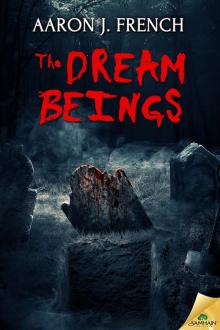 The Dream Beings
The Dream Beings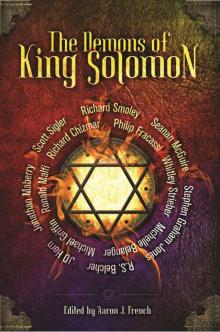 The Demons of King Solomon
The Demons of King Solomon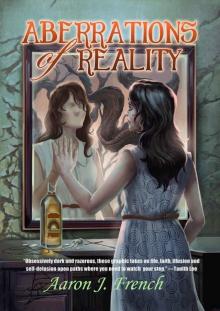 Aberrations of Reality
Aberrations of Reality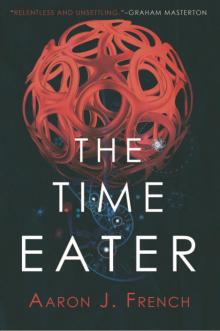 The Time Eater
The Time Eater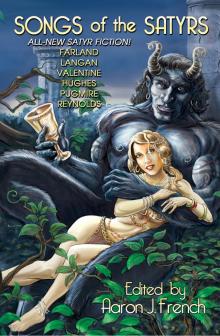 Songs_of_the_Satyrs
Songs_of_the_Satyrs